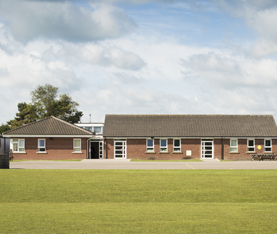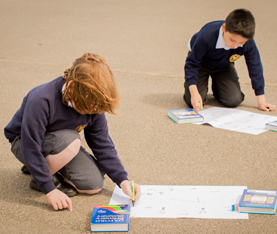Disability Equality Policy
Introduction
Our Lady and St Peter’s School welcomes its general responsibilities under the Disability Equality Duty to have due regard to the need to:
- Promote equality of opportunity between disabled and non-disabled people;
- Eliminate discrimination that is unlawful under the Disability Discrimination Act;
- Eliminate harassment of disabled persons that is related to their impairments;
- Promote positive attitudes towards disabled people;
- Encourage participation by disabled people in public life; and
- Take steps to take account of a disabled person’s impairments, even where that involves treating the disabled person more favourably than other people.
This Scheme sets out the steps the governing body will take that will result in improved outcomes for disabled pupils, parents/carers and staff in all aspects of school life.
School Ethos, Vision & Values
At Our Lady and St Peter’s we are committed to ensuring equality of education and opportunity for disabled pupils, staff and all those receiving
services from the school. We aim to develop a culture of inclusion and diversity in which people feel free to disclose their disability and to participate fully in school life. Our admissions policy does not discriminate against disabled pupils.
The achievement of disabled pupils will be monitored and we will use this data to raise standards and ensure inclusive teaching. We will make reasonable adjustments to ensure that the school environment is as accessible as possible. We will not tolerate harassment of disabled people with any form of impairment.
This school uses the “social model” of disability, as the basis for its work to improve equality for and tackle discrimination against disabled people. This model says that it is the world and society that creates barriers that limit or prevent disabled people from enjoying the same opportunities as people who are not disabled. As a Catholic Christian School our ethos is that everyone is equal in the sight of God and it would therefore be alien to our beliefs to accept any barriers or limitations to anyone. Our equality policies are all based on our intrinsic beliefs.
Definition of Disability
The Disability Discrimination Act 1995 defines a disabled person as someone who has a ‘physical or mental impairment which has a substantial and long-term adverse effect on his or her ability to carry out normal day-to-day activities’.
According to the Disability Discrimination Act, impairment is to be treated as affecting the person’s ability to carry out normal day-to day activities, only if it affects one or more of the following:
mobility, manual dexterity, physical co-ordination, continence, ability to lift, carry or otherwise move everyday objects, speech, hearing or eyesight, memory or ability to concentrate, learn or understand and perception of the risk of physical danger.
The Disability Discrimination Act 2005 has extended the definition of disability to include people with HIV, multiple sclerosis and cancer from the point of diagnosis. Individuals with a mental illness no longer have to demonstrate that it is “clinically well-recognised”; although the person must still demonstrate a long-term and substantial adverse affect on his/her ability to carry out normal day-to-day activities.
How Disabled People have been Involved in the Scheme
Our Lady and St Peter’s recognises the importance of involving disabled people fully in the development of our Disability Equality Scheme. We have involved disabled people in the following ways:
Disabled pupils:
We have identified our disabled pupils
Disabled staff:
We have identified our disabled staff
Key issues identified were:
Hearing the fire alarm in all areas of the school for a member of staff wearing a hearing aid.
Disabled parents/carers:
Wehave consulted with disabled parents and members of the community.
Key issues identified by our disabled parents/carers were:
Outward opening doors
Lack of space/access for a wheelchair in the hall for assemblies and plays
Narrow internal doors.
Disabled members of the local community:
See above.
Disabled pupils were consulted through the school council and on an individual basis.
Parents and community users were consulted through questionnaire, and personally.
The Head’s car parking space has now become a designated disabled parking area.
Outer and inner doors are all new in the last 3 years and it will be some time before these can be altered.
Access to the field and the playground can be secured when the playground and field developments take place.
An advisory group consisting of all the above stakeholders will monitor the progress of the action plan and make further suggestions where necessary.
How we have gathered information on the effect of our policies and practices on disabled people.
We recognise that our policies and practices may impact on disabled people and in particular on:
- The recruitment, development and retention of disabled employees;
- On the educational opportunities available to and the achievements of disabled pupils.
We acknowledge that information gathered from a wide range of sources will be required in order to identify the actions which we need to take to promote disability equality. We will ensure that information is gathered in relation to both employment and the delivery of our services. The processes we use for gathering information will include:
A team including Governors, parents and pupils who will monitor different areas of practice overall. Where possible, areas identified will be dealt with as soon as possible.
Pupil Achievement:
All pupils progress is monitored but SEN is reported separately and it is agreed that in future disabled pupils will also be identified and reported on. (See SEN and Inclusion Policy)
Learning Opportunities:
The school is inclusive and all pupils are afforded the same opportunities in all areas even if substantial adaptations or alterations are required.
The school also takes disabled placements from colleges
Admissions and Transitions:
At both admissions and transition links are developed in-school and with other providers to ensure needs are catered for and information passed on.
Social Relationships:
The school has one disabled pupil at present and the children tend to treat each other equally. Incidents of bullying, discrimination etc. are monitored by the Head and as yet there has been no link to disability.
Employing, Promoting and Training Disabled Staff:
At present there two disabled staff in school.
How we will assess the impact of our policies?
As Policies are revisited Governors will check that the policy is in no way discriminatory against disabled pupils, parents or members of the community. New policies will be examined with the view of looking for areas prejudicial to those who are disabled.
We recognise that all our school’s policies may have an impact on the participation and outcomes for disabled pupils, parents/carers, staff and members of the local community. We have agreed a programme to review the impact of policies and this is contained in our action plan.
Our Action Plan
We have produced a Disability Non Discrimination Policy/Plan to ensure that we fulfil our general and specific duties under the Disability Equality Duty.
Our existing accessibility plan outlines the steps we are taking to improve:
-
curriculum access
-
provision of information to disabled pupils
-
physical access
Reporting
We will report annually about the progress we make on promoting equality of opportunity for disabled people. Our annual report will include details of:
-
information we have gathered during the year
-
how this information was used
-
action points completed during the year and those that are ongoing
Revisiting the Scheme
Our scheme will be reviewed and revised after a period of 3 years and disabled people will be involved in the process. A new action plan will be produced, responding to issues identified through our impact assessment and included in our annual reports.
Signed Stella Clarke

























